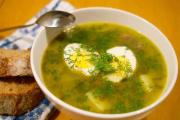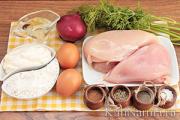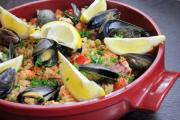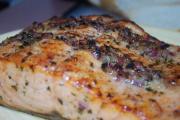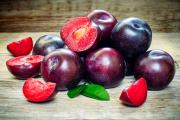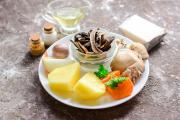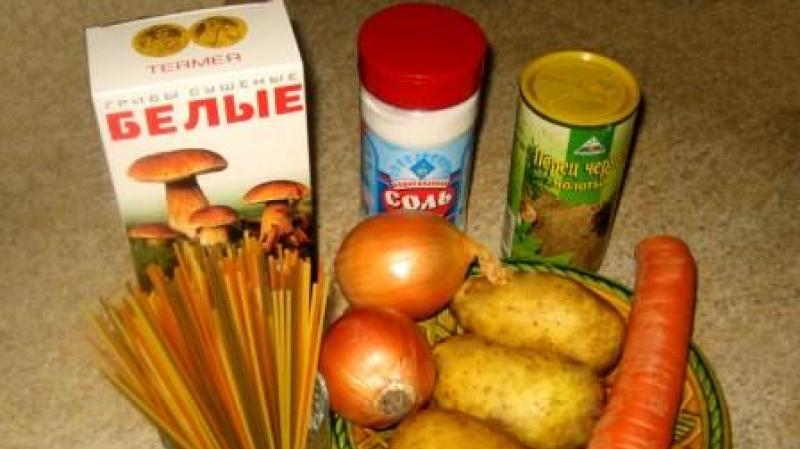Pickled lemons - a recipe for cooking with step by step photos at home. Pickled Lemons What do pickled lemons eat with?
If you live in Russia, then sour cabbage and cucumbers, it is logical. Well, what if you live in Egypt or Morocco? What would you ferment there? Lemons! There are as many varieties of recipes as we have options for those same cucumbers.
I suggest a pretty simple one. This is a specific and very interesting spicy-flavoring additive, suitable for everything that, in fact, pickles are suitable for.
Necessary:
Lemons (preferably thin-skinned) - 500 g
Salt - 35 g
Olive oil (vegetable) - quantity as needed
Garlic - 3-4 cloves
Sweet paprika - 1/2 tsp
Hot pepper and other spices (cardamom, bay leaf, oregano ...) - optional
Cooking:
Rinse the lemons thoroughly, scald with boiling water.

To cut in half.

Halves into pieces of about 5 mm.
Remove bones.

Cut the garlic.
Sprinkle lemons with paprika, salt, add garlic.

Mix. Leave for a couple of hours so that the lemons give juice.

Put tightly in a jar, pour oil on top so that all the pieces are covered.
Not enough in the photo - then I added more so that they would not become moldy.

Leave simply on the table at room temperature for 7-10 days. Then put in the refrigerator.
During fermentation, all bitterness is removed.
Do not expect the same processes as when pickling cabbage - you will not see any gases or foam, lemons pickle very quietly)).
I would advise you to keep them, already fermented, in the refrigerator for another week, and then eat them, so they acquire a complete taste.

What do pickled lemons eat with?
It seems to me that the taste of pickled lemons can be compared with the impression that, for example, olives make on people who have never tried them, at first they may not like it, and then they want more and more.

I just put these lemons on a sandwich with cheese and also drag them from a jar - I really like it)))!
And with fish, and just in some kind of salad - delicious. Naturally, if you don’t like lemons or sour-salty-strong, then you won’t like it, although I highly advise you to make a little for a sample, half a serving.
And don't throw it away right away if it doesn't work for you. Keep it in the refrigerator, maybe they just have not fermented.
Description
Pickled lemons are a rather unusual winter preserve, which in part will taste like more familiar sauerkraut or even cucumbers. In this case, the workpiece will also have its own original taste, which is ideal for many unleavened dishes, as well as fried meat and fish. How useful would such a preparation be? By themselves, lemons are amazingly healthy fruits, they are most often used to treat colds. A large amount of vitamins C contained in the zest of lemons will be given to the marinade and the workpiece. As a result, preservation will not only be a delicious snack, but will also provide support for the body's immune system.
We will ferment lemons at home with olive oil, but without adding vinegar, since lemons are already quite sour. At the same time, an appetizing preparation can be made in the form of circles or chopped fruit into straws. Subsequently, pickled lemons can be served not only as an independent snack, but also used as an ingredient in a cold salad. Creating such a preservation will not take you much time, you will see this from the step-by-step photo of the recipe, which is presented just below.
Let's start cooking delicious unusual pickled lemons with spices for the winter and at the same time learn how to use them!
Ingredients
Pickled Lemons - Recipe
To create such a preparation, Meyer lemons are ideal: they are ripe, thin-skinned with a deep, not prohibitively sour taste. Other varieties matching the above description will also work. Rinse selected lemons thoroughly in cold water several times. This process is important because we will pickle lemons along with the skin. We spread the washed lemons in a colander and scald them with boiling water.

Cut each lemon in half remove all visible bones.

Cut half of the lemons into slices as shown in the photo. The thickness of each slice is not more than 5 millimeters. At this stage, we also remove the remaining bones.

We clean the garlic from the husk and cut into thin slices. Together with sweet paprika, as well as other spices selected to taste, we send pieces of garlic to a bowl with lemon slices.

Gently mix the workpiece and leave it in this form for the next 2 hours or so. This step is necessary for the lemons to release their juice.

After the specified time, we tightly fill the prepared sterilized glass jar with lemon slices, pour the released lemon juice on top, which has managed to mix with spices. Also, pour olive oil or any other odorless vegetable oil into the jar.

Lemons will be fermented at room temperature in the kitchen directly in jars for a week or a little more. After 8-10 days, it is advisable to move the lemons to the refrigerator and insist there for about two more days to consolidate the effect.

How to use pickled lemons is up to you. You can serve such an appetizing and healthy preparation with all those dishes to which you would serve the same sauerkraut or pickles. The compatibility of such an appetizer with other dishes can only be determined by taste. Pickled lemons for the winter are ready!

For 20 years in Israel, I got so used to them, as if from childhood, especially since my youth, I ate lemons not with sugar, but with salt (my Syrian institute girlfriend got addicted) ... These lemons are something like sauerkraut or pickles in Russia, especially since pickles are not very popular here, unlike pickled ones. Spoken: Eh...well, it's just you "Russians" like that. Therefore, it is strange for me to talk about an authentic recipe, for example, which recipe for pickling cucumbers or cabbage is correct and which is not. One hostess adds garlic, another horseradish leaves, a third root, and a fourth hot pepper. One cabbage tears with burdocks, the other with carrots and finely, and the third with quarters. Likewise with lemons. There are ways of salting with quarters, there are halves, and you can also use half-ring rings. Available with or without lemon juice. The time of their readiness depends on all this, from a week to a month. I salt them the way my second cousin's husband, a sultry eastern native Israeli, does. The recipes in my books (for Syrian, Moroccan and Israeli cuisine) revolve around the same thing, and differ mainly in seasoning and cut sizes) Sometimes they are loaded into jars in layers with salt and garlic, and sometimes. like me, they salt it and let it lie down. I like to cut lemons in half rings: they ferment faster, and it’s more convenient to use later, and then you don’t have to cut a wet product that slips out of your hands.
Oriental cuisine is unthinkable without pickled lemons. A spicy, fragrant smell, this is the hallmark of any sharm or falafel. All kinds of sauces, seasonings are prepared from them, they are added to salads, baked meat, chicken. You can’t even imagine what will happen to the fish if such a lemon touches it. It is impossible to enumerate where they can be stuck. Pickled lemons came to us from Arabic cuisine, they are widely used as a seasoning in Morocco and Syria.
So the recipe...
Main Ingredients
1 kg ripe, yellow, preferably thin-skinned lemons (about 9 pieces)
70gr. coarse salt (3-3.5 tablespoons with a slide)
Olive oil
Additional Ingredients:
Garlic
sweet paprika
Hot dried pepper, or hot Yemeni spice khug, or hot paprika - Amount as desired
Possible additives:
cardamom seeds, thyme, cloves, bay leaf, oregano, black pepper, onion...
In addition to salt, I use only sweet paprika, khug or hot pepper and garlic. But she cited possible additives found in my books and on Israeli sites for those who want to dream up. Lemons are now everywhere, so you can experiment with small jars. In one book there is a recipe for long pickled lemons, about a month. If anyone is interested, I can translate. It is written that according to this recipe they are exceptionally tender.
Wash the lemons thoroughly with a brush and scald with boiling water. Cut in half lengthwise and then into slices about 1/2 cm thick. If the lemons have a lot of seeds, partially peel them.
Separately, mix salt with paprika, add lemons, add other seasonings as desired and mix the lemons thoroughly with your hands so that the salt is distributed.
Leave for an hour or two so that the lemons give juice and then tightly fill a pre-prepared clean scalded jar with them, pour over the juice that has been released and pour olive oil on top, about 1 cm in a layer, to prevent mold. If there is not enough juice, then squeeze the juice from the lemon and add to the top. Close tightly, shake and wait
After a few days, look, and if the lemons have settled, then add freshly squeezed lemon juice. The lemons should be ready in a week or two. Ready to put in the fridge
The only problem for me with salting is that I start trying the very next day, and after a week there are no more ready-made ones left.
Ideas with additives partially
as if from childhood, especially since her youth, she ate lemons not with sugar, but with salt. These lemons are something like sauerkraut or pickles in Russia, especially since pickles are not very popular here, unlike pickled ones.
Spoken: Eh...well, it's just you "Russians" like that. Therefore, it is strange for me to talk about an authentic recipe, for example, which recipe for pickling cucumbers or cabbage is correct and which is not. One hostess adds garlic, another horseradish leaves, a third root, and a fourth hot pepper. One cabbage tears with burdocks, the other with carrots and finely, and the third with quarters. Likewise with lemons.
There are ways of salting with quarters, there are halves, and you can also use half-ring rings. Available with or without lemon juice. The time of their readiness depends on all this, from a week to a month. I salt them the way my second cousin's husband, a sultry eastern native Israeli, does. The recipes in my books (in Syrian, Moroccan and Israeli cuisine revolve around the same thing, and differ mainly in seasonings and cut sizes). Sometimes they are loaded into jars in layers with salt and garlic, and sometimes they are salted and allowed to lie down. I like to cut lemons in half rings: they ferment faster, and it’s more convenient to use later, and then you don’t have to cut a wet product that slips out of your hands.
Pickled lemons are widely used in Israel and a number of other countries in the Middle East.
Such lemons have a very interesting taste, which you may not like right away. Where can pickled lemons be used? They can be used to make salad dressings. For the sauce, just take a couple of slices, add olive oil and beat (at the same time chop the lemon slices) with a blender. Such lemons are very well suited for cooking fish and meat. I also like pickled lemons with rice.
How to cook pickled lemons step by step with a photo at home
You need to take a container so that the sliced \u200b\u200blemons fit and it would be convenient to mix them. In this container, mix 70 g of salt, 1 tbsp. l. sugar, 1 tsp ground red pepper and add finely chopped garlic - 2 cloves. The sugar brings out the acid in the lemon and helps the lemons soften.

Lemons (it is better to take with a thin skin) - 500 g wash thoroughly, cut into thin circles. Then cut the circles into halves. If there are a lot of bones, then most of it is better to take it out. It is not critical if a small part of the seeds remain in the lemons.

Then you need to put all the slices of lemons in a jar (you need to put it tightly). There, somewhere on the side, put 1 bay leaf. The released juice, salt and spices that remained at the bottom of the container must also be transferred to a jar of lemons. Leave the jar of lemons warm for 3 days. Shake occasionally to distribute spices evenly. And only after 3 days, add olive oil (you don’t need to add oil right away, since lemons need time to ripen). Pickled lemons are ready.
